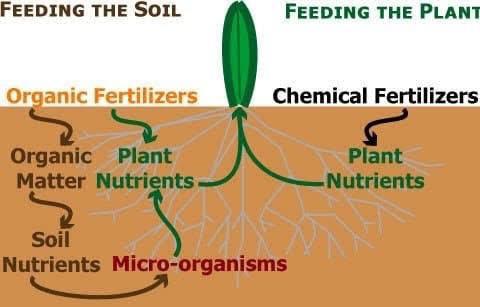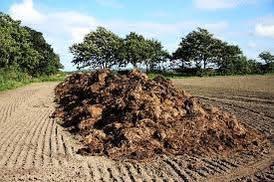Advantages and Disadvantages of ManureAnimals create manure, which is a useful agricultural resource. It comprises various organic components, such as urine, hay, and straw. Nitrogen, phosphorus, and potassium are abundant elements in manure, which can be employed to improve soil fertility and boost crop yields. Manure can be incorporated into the soil in several ways when utilized in agriculture. It can be mulched, spread directly on the soil's surface, or mixed into the ground. To create a nutrient-rich soil amendment, manure can also be composted. 
Manure composted is easier to manage and has less odor and disease-causing germs. Biogas can also be created using manure. This renewable energy source can make electricity and heat residences and commercial buildings. It is produced by decomposing organic material, such as manure, without oxygen. Farmers may need to use less fertilizer and pesticides if they use manure. Manure can also improve soil structure, preserve water, and minimize soil erosion. Farmers may find manure a beneficial resource, but correct handling is essential. Farmers have used manure as agricultural fertilizer for generations to support a healthy soil structure and boost crop production. It is simpler for plants to get the nutrients they require when manure is present because it contains several critical nutrients and bacteria that aid in decomposing organic matter and keeping moisture in the soil. Additionally, it lessens the need for artificial fertilizers, making it more environmentally friendly and sustainable. Manure types include:
Types of Manure for The Garden
Whether fresh, aged, or composted, manure is one of the best ways to add valuable nutrients and organic matter to the soil. Make sure to use it in moderation and test the salinity of your soil before adding larger amounts of manure. Advantages of ManureDue to its dual roles as a natural nitrogen source and a soil conditioner, manure has several benefits as a natural fertilizer for crops. In addition to increasing soil microbial activity, improving soil structure, and enhancing soil's ability to hold water, manure supplies nitrogen and other crucial nutrients required for optimal crop growth. The soil's capacity to hold onto nutrients for plant usage is improved by the organic matter that manure supplies to the soil. Additionally, manure increases crop yields by lowering weed and pest pressure. Finally, manure contributes to nutrient runoff reduction, which helps to lessen water contamination downstream. Promotes Healthy Soil StructureManure promotes healthy soil structure by feeding the soil with nutrients and benefits. These include; Nutrition: Nitrogen, phosphorus, and potassium are three macro- and micronutrients found in manure that are crucial for plant growth. Additionally, it has a microbial activity that improves these nutrients' availability and accessibility to plants. Soil Structure: Manure acts as a natural tilth agent, which helps to aerate and bind soil particles together and promotes a healthy soil structure. This enhances water retention and facilitates root penetration into the soil, allowing plants to receive the water and oxygen they require. 
Pest Control: The ammonia and microorganisms in manure act as a natural pest repellent, helping to reduce the need for chemical-based pest control products. Environmental Benefits: Manure is a sustainable, Eco-friendly fertilizer option as it reduces the need for chemical fertilizers. It also helps to reduce soil erosion, as manure's organic matter helps bind soil particles together. Provide Nutrients to the SoilManure is a fantastic way to add vital nutrients to your soil and support the growth of healthy plants. It is particularly useful for naturally enriching the soil and eliminating the need for harsh chemical fertilizers. Manure gives the soil important organic matter that aids in temperature control and moisture absorption. As a result, the diversity of helpful organisms and bacteria in the soil is encouraged. The three primary nutrients that plants require for growth are nitrogen, phosphorus, and potassium, all of which are abundant in manure. Potassium promotes general plant health and vigor, phosphorus fosters strong roots, and nitrogen helps to promote healthy leaves. Manure also contains several trace minerals, including iron, zinc, and sulfur, necessary for plant development and growth. Manure won't burn plants like chemical fertilizers do because the nutrients are released gradually over time. This greatly simplifies application and reduces the possibility of injury. Leaching is reduced due to the gradual release since the nutrients are absorbed by the plants rather than washed away. Manure also aids in aerating and loosening the soil, facilitating plants' ability to absorb water and nutrients. Important organic matter is also added to the soil by manure. This increases the quantity of humus, or decomposed organic matter, in the soil, which helps to improve its texture and structure. As a result, the soil becomes more fertile and aerated, which promotes healthy microbial growth and even lessens soil erosion. Helps Control Weeds and PestsOne of the first techniques for weed and pest control is using manure in the soil. Many benefits come with manure. It is a crucial component of any effective soil management and pest control program and, when utilized and applied appropriately, can lower expenses and waste. For the control of weeds and pests, manure is a healthy, natural substitute for the use of artificial pesticides and herbicides. It can be used as a fertilizer or put directly into the soil as a mulch or top dressing. It is made out of the excrement of agricultural animals, particularly cows and horses. Manure aids in tying soil particles together when used as a mulch or fertilizer, allowing the soil to retain moisture. Having weeds, pests, and diseases under control is made possible by the wet soil environment, which inhibits their growth. Adding organic matter from the manure increases the soil's texture, structure, and nutrient availability for crop growth. Additionally, it aids in maintaining the balance and health of the soil, which reduces soil erosion and aids in the preservation of soil moisture. Also, manure contains beneficial bacteria that compete with other living things to lessen pest and disease occurrence when applied to the soil. Additionally, the manure compost offers a perfect habitat for beneficial species that live in the soil, like earthworms and bacteria that may break up and aerate the soil. Reduces Chemical Fertiliser UseManure is used to feed the soil in addition to the plants. Potassium, nitrogen, and phosphorus are all vital plant nutrients abundant in manure. Most essential, manure contains microbes that support the soil's ability to break down plant leftovers. This enables a cycle of nutrient replenishment that results in wholesome and fruitful soil. The general soil structure is also enhanced by manure. The nutrient-rich substance aids in enhancing the soil's ability to retain water, making it more porous for roots. As a result, less water must be used for irrigation, protecting a valuable resource. Manure also can raise the pH of the soil, improving its fertility. Manure is a cheap way to guarantee healthy crop output. Manure is less expensive and more accessible than chemical fertilizers. There are even more environmentally friendly options for manure, including biogas, fish offal, and worm castings. Applying manure sparingly and incorporating it into the top few inches of soil before planting will maximize its benefits. Improves Soil FertilityAlthough technologically enhanced fertilizers are frequently suggested for improved soil and increased crop yields, manure is still a potent weapon in the gardener's toolbox. 
Food production improves in quality and quantity due to adding manure to the soil to make it more fertile. As the manure decomposes, seeps into the topsoil, and sinks deeper into the substrate, it releases its nutrients. Manure primarily makes nitrogen (N) and phosphorus (P), two important plant nutrients, more readily available in the soil. Additionally, it gives the plants vital micronutrients. Utilizing manure also aids in retaining moisture in the soil, acting as a helpful and natural form of irrigation. The healthy root development and disease resistance in plants are both influenced by this high moisture content. Manure reinforces the soil's structure by introducing organic matter, which also increases soil permeability, drainage, and aeration. Cost EffectiveOne of the most economical and eco-friendly methods for fertilizing lawns, gardens, and crops is manure. Manure, used as a soil supplement, supplies vital nutrients like nitrogen, phosphorous, and potassium and fosters the health of the soil. Manure enhances soil structure, and water-retentiveness lessens soil erosion and aids in limiting chemical runoff and leaching. Manure utilization is crucial in organic agricultural systems because these systems frequently rely on compost and organic fertilizers. A plentiful and renewable resource is manure. It is the best source of organic matter, macro- and micronutrients, and numerous crucial trace elements for crop productivity because it is affordable and sustainable. Manure also offers several other advantages to soils, including enhancing soil structure, lowering soil compaction, promoting microbial activity, and assisting in erosion prevention. Manure also aids in enhancing the soil's capacity to retain water, which lowers water and nutrient losses from the soil. Manure helps to reduce chemical fertilizer runoff and leaching into neighboring streams and groundwater, which is excellent for the environment. Eutrophication and water contamination, which can be harmful to the ecosystem, can be avoided in this way. Additionally, manure can aid in the sequestration of carbon and other greenhouse gases, lessening the effects of climate change. Finally, manure is a cost-effective soil amendment with several environmental benefits. The use of manure can also reduce the need for chemical fertilizers, helping farmers adhere to organic farming principles while maintaining crop yield and quality. For these reasons, manure can help reduce production costs, increase profits, and enhance the environmental sustainability of crop production systems. Transported EasilyManure is one of the most beneficial and easily transported fertilizers available, and its use can significantly benefit farmers and soil health. Manure adds vital nutrients to the soil and naturally adds organic matter, allowing for higher water retention and increased biological activity in the soil. On top of improving soil qualities and fertility, manure can easily be transported by farmers to their fields, ensuring they are well-provisioned with the nutritional needs of their land. Manure is lightweight and easy to work with, and the stored nitrogen, phosphorous, and potassium content provide numerous benefits for crop growth. Additionally, manure adds a significant amount of organic matter, which helps aggregate soil-binding soil particles together and making the soil more porous. This has various positive effects, such as improved water infiltration, increased aeration, and lower water runoff. Furthermore, manure can contain beneficial microorganisms, beneficial fungi, and bacteria that help break down soil and create humus--a nutrient-rich layer of soil. Beyond soil benefits, manure also helps reduce erosion on slopes where other fertilizers cannot. And when properly composted, manure can be an effective form of weed suppression and pest control. Disadvantages of ManureManure may be an effective fertilizer that enriches the soil's fertility, but its use may result in some disadvantages. Manure has some potential disadvantages when used as fertilizer. It can contain weed and pest seeds, rodents and other pests, and pathogens such as E. coli. It can also cause pollution if not managed properly, as the manure may flow into the surface or groundwater. Additionally, manure can produce unpleasant odors if not stored, or applied to fields, correctly. ExpensiveAlthough manure has long been utilized as a crop fertilizer, it has several disadvantages in farming. The expense of using manure is one of its key drawbacks. Manure is typically more expensive to purchase than synthetic fertilizers. Manure is more expensive to transfer and store because it is also heavy and difficult to transport. Manure frequently has fewer nutrients than synthetic fertilizers when it comes to nutrient content. Although manure can supply nutrients like nitrogen and phosphate, it also contains additional elements like potassium and calcium that are typically found in larger amounts in synthetic fertilizers. This indicates that additional manure must be applied to supply the nutrients required for crop growth. Additionally, because it can release ammonia, nitrogen, and phosphorus into groundwater, manure has the potential to pollute the environment if it is not handled and disposed of appropriately. High levels of these nutrients may eventually cause algal blooms and other problems with water quality. Unpleasant SmellManure has long been used as a fertilizer for plants and soil, but it can also have unpleasant consequences. The smell of manure is strong and can permeate a nearby area. As it decomposes, the smell can become even worse. In a larger body of water, the decomposition of the manure may cause a large algal bloom, resulting in further odorous problems. Manure also can pose contamination risks to nearby food sources and water supplies due to the presence of pathogens and parasites that it can carry. The excessive levels of nitrates, phosphates, and ammonia present in manure can also lead to nutrient overload in neighboring bodies of water. These nutrients disrupt the aquatic eco-balance system and can lower the water's oxygen content. Furthermore, manure runoff frequently causes eutrophication of water resources, which can result in places deemed filthy for human use and for commercial or recreational purposes. Ammonia ContentThe increased ammonia in manure can be a disadvantage as it can cause air pollution and fish kills. This is largely a result of nitrogen runoff from animals ingesting large amounts of high-protein feeds. Ammonia is very soluble in water and is quickly transferred from the animal's waste, spreading into the environment and causing irreparable damage. Additionally, high ammonia concentrations in the air can reduce air quality and cause human breathing problems. In worse cases, it can even be fatal. Ammonia in water can cause problems from fish mortality to algal blooms and reduced water quality. Incorrect UsageSince ancient times, manure has been used as a fantastic natural fertilizer to increase agricultural production. Unfortunately, improper manure management techniques can harm the environment and human health. Manure can be used improperly to contaminate the water and air with extra nutrients, diseases, and pollutants. Applying manure incorrectly or in excess can result in eutrophication, a condition where too many nutrients enter a body of water and cause excessive algae growth. In downstream locations, excess nutrients from animal sources, such as phosphate and nitrogen, cause more sedimentation. These excessive contaminants have the potential to degrade water quality, affect activities involving water, and render the water unfit for swimming or drinking. Animal manure that has not been properly managed can cause air pollution, including the production of volatile organic compounds like ammonia, dust, and smells. These airborne pollutants increase the risk of ground-level ozone and other air pollutants by spreading out and affecting the air quality hundreds of miles away. Manure application errors can also enhance the likelihood that people will contract specific diseases. Animal excrement may contain dangerous pathogens that, if handled improperly, can make people sick. Animal manure can transmit contagious illnesses like E. coli, Salmonella, and Giardia, which can affect health. Manure must be handled carefully to prevent potential harm to the environment, human health, and economic well-being. A manure management plan should be made specifically for livestock producers who may use significant amounts of animal waste in their operations. Producers must also abide by municipal, state, and federal laws governing the safe handling, application, and storage of animal excrement. With the right preparation and information, improper manure usage can be avoided and have negative long-term effects. ContaminationContamination in manure is a serious concern because it can lead to groundwater contamination and long-term health risks from ingesting contaminated soils and plants. Certain contaminants, including heavy metals and antibiotics, can accumulate in animal tissues and enter the human food chain. This contamination can have serious consequences as many metals are toxic while antibiotics can produce bacterial resistance. Manure can also be affected by various other contaminants, including air pollution, insecticides, hormones, and medicines. These pollutants can be absorbed through plant leaves and roots, enter the food chain and accumulate in the body over time. Contaminated manure can be difficult to identify and dangerous if consumed. Furthermore, contaminated manure can have a significant environmental impact, seeping into water courses and contaminating drinking water supplies. Finally, there are increased risks associated with spreading contaminated manure. Potentially hazardous substances can spread to other areas and contaminate agricultural soils, crops, and livestock, damaging the entire agricultural system. ConclusionManure is a natural resource that is a great source of organic materials, nitrogen, and phosphorus, aiding in the production of healthier plants and crops. It can also help reduce soil erosion and improve soil structure, leading to increased water retention and nutrient availability in the soil. However, it also has a few drawbacks. Manure can contain hazardous contaminants, such as heavy metals, pharmaceuticals, and pathogens, that can harm human health. It can also attract pests, such as flies and rodents, if not managed properly. Additionally, improper application of manure can lead to water and air pollution. So by keeping in view and balancing its advantages and disadvantages Manure can be put to optimum use. |
 For Videos Join Our Youtube Channel: Join Now
For Videos Join Our Youtube Channel: Join Now
Feedback
- Send your Feedback to [email protected]
Help Others, Please Share










